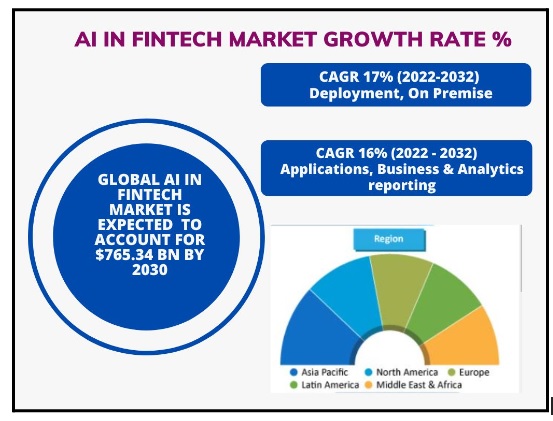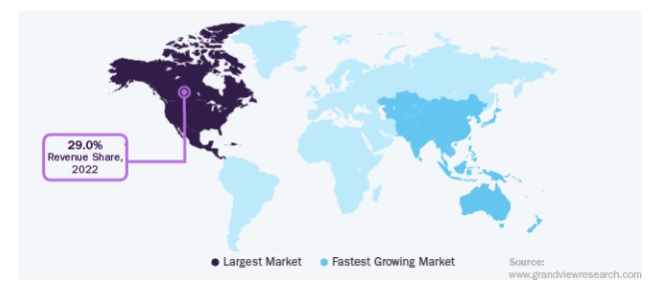The realm of financial technology, widely known as fintech, has witnessed a remarkable metamorphosis by leveraging cutting-edge technology to enhance financial services and streamline operations within the industry. Over the years, fintech has played a pivotal role in reshaping the financial landscape, catalysing revolutionary changes that range from optimising payment systems to transforming lending practices, ultimately resulting in a superior service experience.
As technology progresses at an exponential pace, fintech solutions are becoming increasingly sophisticated, presenting a myriad of opportunities for further innovation and growth. In this realm of endless possibilities, the emergence of artificial intelligence (AI) has unlocked a whole new realm of potential for the future of fintech. By harnessing the capabilities of AI, fintech continues to redefine the financial landscape, empowering it to be more inclusive, efficient, and customer-centric.

In this article, we delve into six pivotal trends that are poised to shape the future of fintech in the forthcoming years, as AI solidifies its position as a game-changer within the financial industry. Explore these transformative trends that showcase the immense potential and unrivalled possibilities that lie ahead in the world of fintech.
Trend 1: Fraud Detection And Security
Role of AI in Fraud Detection And Prevention
From advanced pattern recognition to behavioural analysis, AI plays an important role in fraud detection and prevention in the financial sector. AI algorithms can analyse vast amounts of data and identify patterns that may indicate fraudulent activities. By leveraging machine learning techniques, AI systems can learn from historical data to detect anomalies and deviations from normal behaviour, flagging potentially fraudulent transactions or activities.
Financial institutions are discovering that AI is a rapid, effective, and efficient tool for detecting fraud. According to a report by Fintech News in 2021, banks are adopting AI-powered systems at an unprecedented rate, investing over $217 billion in AI applications to combat fraud and evaluate risk. What’s even more encouraging is that 64% of these institutions have confidence in AI’s ability to proactively anticipate and prevent fraudulent activities.
AI plays a vital role in fraud detection and prevention by using advanced pattern recognition, real-time monitoring, behavioural analysis, continuous learning, automation, and network analysis. It improves efficiency, reduces human error, and can handle large volumes of data. With its proactive approach and ability to adapt to evolving fraud patterns, AI strengthens the defence against fraud, protecting customers’ assets and information.
Advanced ML Algorithms Used In Security
In the realm of financial security in fintech, advanced technologies and machine learning algorithms are employed to ensure robust protection against threats.
For example, machine learning algorithms are used extensively in financial security to analyse large datasets, detect patterns, and make accurate predictions. Supervised learning algorithms can classify transactions as fraudulent or legitimate based on historical data, while unsupervised learning algorithms can identify anomalies or unusual behaviour that may indicate fraud.
With several benefits to using predictive analytics in financial decision-making, it is one more technology that many fintech uses for making calculated decisions. The use of predictive analytics leverages historical data and machine learning algorithms to anticipate potential fraudulent events. By identifying patterns and trends, predictive models can provide early warnings, enabling proactive measures to mitigate risks.
Corestrat’s Model.ai stands as an exemplary case of leveraging predictive analytics technology to build models that empower enterprise users to make more intelligent business decisions. Identifying actionable and concealed patterns within the data, it facilitates a closer alignment with strategic goals and enables users to make informed decisions.
These advanced technologies and machine learning algorithms contribute to a multi-layered approach to financial security in fintech. By leveraging their capabilities, fintech companies can mitigate risks, protect customer data, and ensure a safe and trustworthy financial ecosystem.
Trend 2: Personalised Customer Experience
In the financial sector, personalised customer experience has become a key focus for businesses. Financial institutions can gain insights into individual customer preferences, behaviours, and needs by leveraging data analytics, artificial intelligence, and machine learning. This allows them to offer tailored products and services, customised recommendations, and personalised communication.
AI-Powered Virtual Assistants To Enhance Customer Engagement And Support
AI-powered chatbots and virtual assistants have revolutionised the way the financial sector interacts with customers. These intelligent virtual agents leverage natural language processing and machine learning algorithms to understand and respond to customer queries, provide assistance, and offer personalised recommendations.
Chatbots and virtual assistants can handle a wide range of tasks, such as answering FAQs, providing account information, guiding users through transactions, and offering financial advice. They are available 24/7, providing round-the-clock support and improving customer satisfaction. With their ability to quickly analyse data and access relevant information, AI-powered chatbots and virtual assistants enhance efficiency, reduce wait times, and deliver a seamless customer experience in the financial sector.
By engaging chatbots for simple query resolution and mundane problem-solving, financial institutions have improved their response time by 60% and reduced customer service costs by up to 30%. Chatbots enable the finance industry to swiftly resolve issues without relying on support staff, making them an effective solution for speedy customer support.
By leveraging AI capabilities, financial institutions can enhance customer engagement and support by providing personalised recommendations, instant assistance, intuitive interactions, proactive solutions, and robust security measures. These advancements contribute to building stronger customer relationships, improving satisfaction, and driving business growth in the financial sector.
Trend 3: Risk Assessment And Credit Scoring
Risk assessment and credit scoring are vital components of the finance sector. These processes evaluate the creditworthiness of individuals and businesses, helping financial institutions make informed lending decisions. Advanced technologies, such as AI and data analytics, have revolutionised risk assessment, enabling more accurate evaluations and efficient credit scoring.
How AI Is Revolutionising Risk Assessment And Credit Scoring Processes?
AI is revolutionising risk assessment and credit scoring processes, bringing significant advancements to the financial industry. With its ability to analyse vast amounts of data and leverage complex algorithms, AI is transforming traditional credit scoring models and enhancing risk assessment practices.
AI-driven systems can process diverse data sources, including financial records, transaction histories, and alternative data such as social media activity, enabling a more comprehensive evaluation of an individual or business’s creditworthiness. By incorporating a wide range of factors, AI models produce more accurate risk assessments and credit scores, leading to more informed lending decisions.
AI-powered risk management systems offer real-time monitoring capabilities, continuously analysing data to identify changes in creditworthiness or potential risks promptly. This proactive approach helps financial institutions mitigate risks and make timely adjustments to their lending practices.
AI also improves efficiency by automating and streamlining the risk assessment and credit scoring processes. This reduces manual effort, saves time, and allows for faster decision-making, enhancing operational efficiency for both lenders and borrowers.
Take, for example, Corestrat’s Digital Lending Automation, which empowers companies to implement and automate decision-making processes in areas such as risk evaluation for new credit origination, management of existing credit exposures, price calculations, and product recommendations, all at a scalable level.
Overall, AI’s advanced analytics, predictive modelling, and real-time monitoring capabilities are revolutionising risk assessment and credit scoring, providing more accurate assessments, expanding access to credit, and improving decision-making for the financial industry.
Benefits Of Using AI In Predicting Creditworthiness
The application of AI in creditworthiness prediction offers significant advantages to the financial industry. By analysing extensive data from both conventional and non-traditional sources, AI algorithms produce precise assessments of credit risk, resulting in enhanced decision-making and lower default rates. Additionally, AI-powered credit scoring models accelerate processing times, enabling borrowers to access credit promptly.
Furthermore, AI eliminates subjective biases, ensuring impartial and fair evaluations. Leveraging AI empowers financial institutions to make well-informed lending decisions, widen credit availability, and effectively manage risks, ultimately improving operational efficiency and driving profitability.
Trend 4: Alternative Financing
Alternative financing refers to non-traditional methods of funding that bypass traditional banking channels. It encompasses a wide range of options, including peer-to-peer lending, crowdfunding, invoice financing, and revenue-based financing. Alternative financing provides businesses and individuals with accessible and flexible funding solutions, particularly for those who may face challenges obtaining traditional bank loans.
These options often leverage technology platforms to connect borrowers with investors or lenders, facilitating a streamlined and efficient funding process. Alternative financing has gained popularity due to its ability to offer diverse funding sources, faster access to capital, and customised financial solutions that cater to specific needs and circumstances.

Trend 5: Regulatory Compliance And Regulatory Technology (Regtech)
Regulatory compliance refers to the adherence of organisations to laws, regulations, and standards set by regulatory bodies. In the financial industry, regulatory compliance is crucial to ensure ethical conduct, protect consumers, prevent financial crimes, and maintain market stability.
AI’s Role In Automating Regulatory Compliance Processes
AI plays a crucial role in automating regulatory compliance processes by providing efficient and accurate solutions. AI algorithms can analyse vast amounts of regulatory data, including laws, regulations, and compliance requirements, at a much faster pace than humans. This enables financial institutions to stay updated with ever-evolving regulatory landscapes and ensures adherence to compliance standards.
Overview Of Regtech Solutions Powered By AI
RegTech solutions powered by AI leverage machine learning and natural language processing to automate various compliance tasks. These solutions can monitor and analyse large volumes of data in real-time, identify potential compliance issues, and generate reports. AI-powered RegTech platforms also enable risk assessment, fraud detection, and transaction monitoring to ensure compliance with Anti-Money Laundering (AML) and Know Your Customer (KYC) regulations. Additionally, AI-based analytics help in detecting patterns and anomalies, providing valuable insights for regulatory reporting and audits.
Considerations In Implementing AI-Driven Regtech Solutions
Implementing AI-driven RegTech solutions involves certain challenges and considerations. Firstly, data privacy and security must be prioritised to protect sensitive information while utilising AI algorithms. Ensuring transparency and interpretability of AI models is crucial to gaining regulatory approval and maintaining trust.
Additionally, collaboration and coordination with regulators are essential to align AI-driven solutions with existing compliance frameworks. Financial institutions must invest in robust infrastructure and data management systems to handle the increased volume and complexity of data. Furthermore, ongoing monitoring, testing, and validation of AI algorithms are necessary to ensure their effectiveness and compliance with changing regulations.
Trend 6: Smart Contract and Blockchain Integration
The intersection of AI, smart contracts, and blockchain technology has the potential to revolutionise various aspects of the fintech industry. Smart contracts are self-executing agreements that automatically execute predefined terms when specific conditions are met. Blockchain, on the other hand, is a decentralised and transparent ledger that securely records and verifies transactions.
By combining AI and blockchain, smart contracts can be enhanced with advanced decision-making capabilities. AI algorithms can analyse vast amounts of data, learn from patterns, and make intelligent decisions within the smart contract framework. This enables the automation of complex and data-driven processes, such as insurance claims processing, supply chain management, or asset transfers.
The benefits of integrating AI and blockchain technologies in fintech are numerous. Firstly, the transparency and immutability of blockchain provide a secure and trustworthy environment for executing AI-powered smart contracts. This eliminates the need for intermediaries, reduces transaction costs, and enhances efficiency. Additionally, the decentralised nature of blockchain ensures that data and decisions are not controlled by a single entity, increasing trust and reducing the potential for fraud.
Overall, the integration of AI, smart contracts, and blockchain technology opens up new possibilities for creating decentralised, secure, and efficient financial systems. The synergy between these technologies can lead to enhanced automation, improved accuracy, and increased trust in various fintech applications, ultimately driving innovation and transforming the financial industry.
Conclusion
The world of fintech is rapidly evolving, and AI-driven technologies are playing an increasingly important role in this evolution. This article has explored six key trends to look out for in the coming years, as AI continues to revolutionize the financial industry.
From automated financial services to enhanced security and blockchain solutions, AI-driven technologies are transforming the way that organizations offer financial services to their customers. By staying ahead of the curve, organisations can ensure that they are providing customers with the best possible services most efficiently.
 Skip to content
Skip to content


